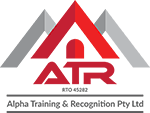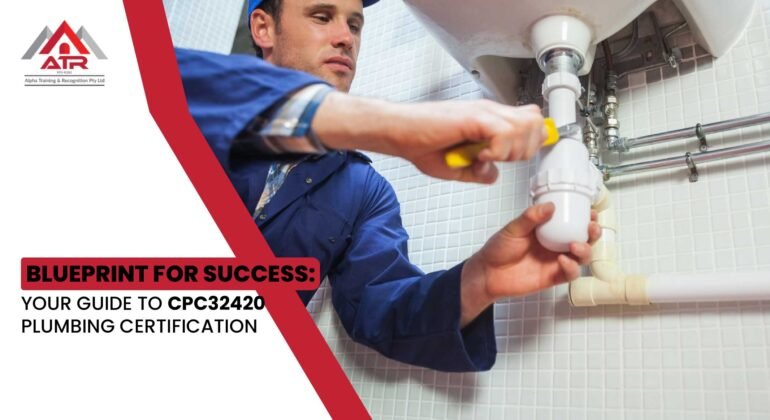Overview:
Welcome to the world of plumbing, where precision, expertise, and problem-solving skills are essential for success. In this detailed guide, we provide a blueprint for achieving plumbing certification in CPC32420 Plumbing, offering insights into apprenticeships, industry standards, safety regulations, and practical skills needed for a rewarding career in plumbing.
- Understanding Certificate III in Plumbing
Certificate III in Plumbing (CPC32420) is the cornerstone qualification for individuals seeking to enter the plumbing industry. It provides the foundational knowledge and practical skills required to work as a licensed plumber. Think of this certification as the key that unlocks the door to a fulfilling career in plumbing – just as a key grants access to a locked room, CPC32420 opens up opportunities in the plumbing profession.
- Navigating Plumbing Apprenticeships
Plumbing apprenticeships offer a hands-on learning experience, combining on-the-job training with classroom instruction. Apprentices work under the guidance of experienced plumbers, gaining practical skills and knowledge while earning a wage. Imagine an apprentice blacksmith learning the craft from a master metalsmith – similarly, a plumbing apprentice hones their skills under the mentorship of seasoned professionals, mastering the art and science of plumbing through real-world experience.
- Upholding Industry Standards
Adherence to industry standards is paramount in the plumbing profession, ensuring quality workmanship and compliance with regulations. Plumbers must stay abreast of industry guidelines and best practices to deliver safe and reliable plumbing services. Think of industry standards as the blueprint for constructing a sturdy building – just as a blueprint guides construction, industry standards guide plumbing practices, ensuring consistency and reliability in plumbing installations.
- Prioritizing Occupational Health and Safety
Occupational health and safety (OHS) is a top priority in the plumbing industry, where workers face potential hazards such as exposure to hazardous materials and working at heights. Plumbers must undergo OHS training and follow safety protocols to prevent accidents and injuries on the job. Envision a skilled tightrope walker navigating a high wire with precision – similarly, a safety-conscious plumber balances the risks of the job with meticulous attention to safety procedures, ensuring a secure working environment for themselves and their colleagues.
- Mastering Water Supply Systems
Water supply systems play a crucial role in modern plumbing, providing clean and reliable water for domestic, commercial, and industrial use. Plumbers must understand the principles of water supply, including water pressure, flow rates, and distribution systems. Imagine a hydraulic engineer designing a network of underground pipes – similarly, a knowledgeable plumber designs and installs water supply systems that deliver water efficiently and reliably to end users.
- Navigating Drainage Systems
Effective drainage systems are essential for removing wastewater and preventing flooding and water damage. Plumbers must possess expertise in designing, installing, and maintaining drainage systems to ensure proper function and compliance with building codes. Think of a skilled architect planning a city’s sewer system – similarly, a proficient plumber designs and constructs drainage systems that channel wastewater away from properties and into treatment facilities, safeguarding public health and the environment.
- Mastering Pipe Installation Techniques
Pipe installation is a core skill in plumbing, involving the assembly and connection of various piping materials to create plumbing systems. Plumbers must be proficient in pipe cutting, threading, soldering, and welding techniques to ensure leak-free installations. Imagine a skilled tailor sewing together pieces of fabric to create a garment – similarly, a skilled plumber joins sections of pipe together to create a seamless network that transports water and other fluids with precision and efficiency.
- Utilizing Plumbing Tools and Equipment
Plumbers rely on a diverse array of tools and equipment to carry out their work efficiently and effectively. From wrenches and pipe cutters to drain snakes and hydro-jetting machines, having the right tools for the job is essential. Envision a master craftsman selecting the perfect chisel for a woodworking project – similarly, a skilled plumber chooses the appropriate tools and equipment for each plumbing task, ensuring optimal results and customer satisfaction.
- Conducting Plumbing Maintenance
Regular maintenance is crucial for preserving the integrity and functionality of plumbing systems. Plumbers perform inspections, repairs, and preventative maintenance to identify and address issues before they escalate into costly problems. Think of a diligent caretaker tending to a garden, pruning branches and watering plants to ensure their health and vitality – similarly, a proactive plumber maintains plumbing systems, preserving their performance and longevity for years to come.
- Documenting Plumbing Work
Documentation is an essential aspect of the plumbing profession, providing a record of work performed, materials used, and any relevant observations or recommendations. Accurate documentation helps ensure transparency, accountability, and compliance with regulatory requirements. Imagine an archivist meticulously cataloging historical manuscripts – similarly, a thorough plumber documents their work with precision and attention to detail, leaving a valuable record for future reference and analysis.
- Embracing Sustainable Plumbing Practices
In recent years, there has been a growing emphasis on sustainability in the plumbing industry. Plumbers are increasingly incorporating eco-friendly materials, water-saving fixtures, and energy-efficient technologies into their installations. By promoting sustainability, plumbers can reduce environmental impact and contribute to conservation efforts. Imagine a forward-thinking architect designing a green building with solar panels and rainwater harvesting systems – similarly, a progressive plumber integrates sustainable practices into their work, creating plumbing systems that minimize resource consumption and promote environmental stewardship.
- Staying Updated on Plumbing Codes and Regulations
Plumbing codes and regulations are constantly evolving to reflect changes in technology, building practices, and safety standards. Plumbers must stay informed about the latest codes and regulations to ensure compliance with local, state, and national requirements. Envision a legal scholar studying statutes and case law to stay abreast of legal developments – similarly, a knowledgeable plumber keeps up-to-date with plumbing codes and regulations, ensuring that their work meets legal and safety standards and avoids costly violations or delays.
- Managing Water Quality and Treatment
Ensuring safe and clean water is essential for public health and well-being. Plumbers play a crucial role in managing water quality and treatment by installing and maintaining water treatment systems, such as filtration and purification systems. By addressing water quality issues, plumbers help protect communities from waterborne illnesses and contamination. Think of a guardian angel watching over a village, safeguarding its inhabitants from harm – similarly, a vigilant plumber protects public health by ensuring that water treatment systems function properly and deliver safe drinking water to households and businesses.
- Collaborating with Other Trades
Plumbing is often part of larger construction projects that involve multiple trades and disciplines. Plumbers must collaborate closely with architects, engineers, electricians, and HVAC technicians to ensure seamless coordination and integration of plumbing systems with other building components. Imagine a conductor leading an orchestra, coordinating musicians of different talents and instruments to create a harmonious symphony – similarly, a skilled plumber orchestrates the efforts of various trades, ensuring that plumbing installations align with architectural plans and mechanical systems to achieve optimal results.
- Providing Exceptional Customer Service
Customer service is a hallmark of success in the plumbing industry. Plumbers must communicate effectively with clients, address their concerns, and provide solutions to their plumbing issues in a timely and professional manner. By delivering exceptional customer service, plumbers build trust and loyalty with their clients, leading to repeat business and referrals. Envision a hospitality concierge catering to the needs of guests with grace and efficiency – similarly, a courteous plumber goes above and beyond to exceed customer expectations, leaving a lasting impression of professionalism and reliability.
- Continuing Professional Development
The plumbing industry is constantly evolving with new technologies, materials, and techniques emerging regularly. Plumbers must commit to ongoing professional development to stay current with industry trends and advancements. By pursuing additional training, certifications, and workshops, plumbers can expand their skills and expertise, opening up new opportunities for career growth and advancement. Think of a seasoned artisan refining their craft through lifelong learning – similarly, a dedicated plumber invests in their professional development, striving for excellence and mastery in the dynamic field of plumbing.
In conclusion:
achieving certification in CPC32420 Plumbing is a journey of learning, skill development, and dedication to excellence in the plumbing profession. By understanding the fundamentals of plumbing, gaining practical experience through apprenticeships, adhering to industry standards and safety regulations, and mastering essential skills such as water supply systems, drainage systems, pipe installation techniques, and plumbing maintenance, aspiring plumbers can lay the foundation for a successful career in this vital and rewarding field. With CPC32420 certification as their guide, they can embark on a journey of growth, opportunity, and fulfillment in the dynamic world of plumbing.



